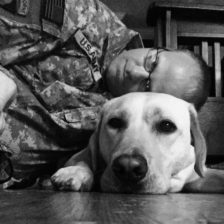Post-Traumatic Stress Disorder lives in our home. I hate that we acknowledge this some days, giving this disorder some power, giving this disorder a place to surface on some days, but we have to acknowledge that due to PTSD sometimes things are just different, and sometimes we have to adjust. So, what do you do? What do we do? How do we acknowledge this when we work so hard to live with it—well, signs and symptoms are always in my mind, and if you don’t understand PTSD, maybe some of these will help you understand what some days can be like in our home, and what some days are like for Sam.
You make wake up tired every day, every.single.day. That even goes for days when napping occurs—but there’s a constant feeling of being tired. As I’ve mentioned in some previous posts, sleep doesn’t always come easy for Sam. There are nights where he tosses and turns all night. I don’t always realize it, but I can see it when we are up and starting our day. He looks exhausted. He moves a little slower. It takes him awhile to get going—he might be a little more forgetful, he might just need a couple of reminders to get going, but he’s tired. I can’t imagine being that tired day in and day out.
Sleep is always on Sam’s mind, but sometimes the thought of closing his eyes is exhausting. Nightmares happen. There’s a lot of movement, jerking, tossing, turning, nights where Sam wakes up drenched in sweat. That’s due to PTSD. Some nights are easy, but some are simply exhausting. The not really sleeping is a cruel cycle. Sometimes Sam says that he doesn’t even know that he really slept during the night. Despite the “tricks” we use (aromatherapy, sleepy time tea), sleep is hard to come by. Add in a little depression and anxiety to that and there are other contributors to not sleeping, thanks, PTSD.
Sam has a heightened sense of awareness that could sometimes be a distraction. Here’s an example. If we go out to a restaurant, Sam typically sits with his back to a wall where he can keep an eye on all the things: people, door, and other surroundings—doing that for himself and for us, to make sure things are okay. Keeping a watchful eye can also be exhausting. There are times we get seated in a restaurant and we have to ask to be moved, not because of Memphis, but because it is a little uncomfortable for Sam. We try to make it work, and sometimes it is completely difficult to focus on one another and enjoy the meal rather than worry about exits, location of people, and where the table is located.
Learning about PTSD means a lot to us—and to many other people who may be suffering as well. Taking time to educate yourself and read up on disabilities, disorders, and illness could really have a lot of benefits. You may be more likely to understand why Sam does (or may not do) whatever it is he’s been doing. It might also help you know ways to offer assistance, or just allow you to talk about what is going on. Some people may just need a listening ear. Maybe someone just wants to talk about their troubles and it may or may not invlove their medical problems. Feelings needs to come out, having a safe place to talk about them can mean the world to someone.
In light of trauma, some people (Sam included) feel that they are not their true selves—meaning their real self may hide, retreat, or be buried deep below. It is a way to cope, I think, and sometimes I can tell if Sam is a little distant, not really “in the room,” “in the moment,” and he might be lost in a thought or memory. Sometimes PTSD really limits the view of someone, how they see themselves, the world, and the people around them. The world is a little different thanks to PTSD. Every moment could be dangerous, but support on this journey is key. Gentle reminders that outside of PTSD and trauma there is an opportunity for that true self to surface and shine.
People who have PTSD cannot just “get over it.” The first time I was asked why Sam wasn’t better I was furious. I had to walk away for a minute. What I had to remember is that this person may not understand PTSD and the fact that unfortunately, with PTSD, nothing really fades. If anything it is vivid, real, and very present despite the time that passes. Sam’s body will never let him forget about the memories of war, and he cannot just simply “get over it.” He’s trying to make peace, he’s healing, but it is a process—a process that cannot be rushed.
Finding support has been key—for Sam and myself. Sometimes simply getting up and going about our daily routine is the biggest step toward processing and living with PTSD. Be patient, keep reaching out, give comfort, believe in those with PTSD, offer encouragement, and most importantly, be informed.




The soldier I never knew, but am starting to learn about…my how he has grown and learned to process some of the events from war.

Bless your heart, Cathrine. This is REALLY a good post. Praying for you and your Family!
LUV U!